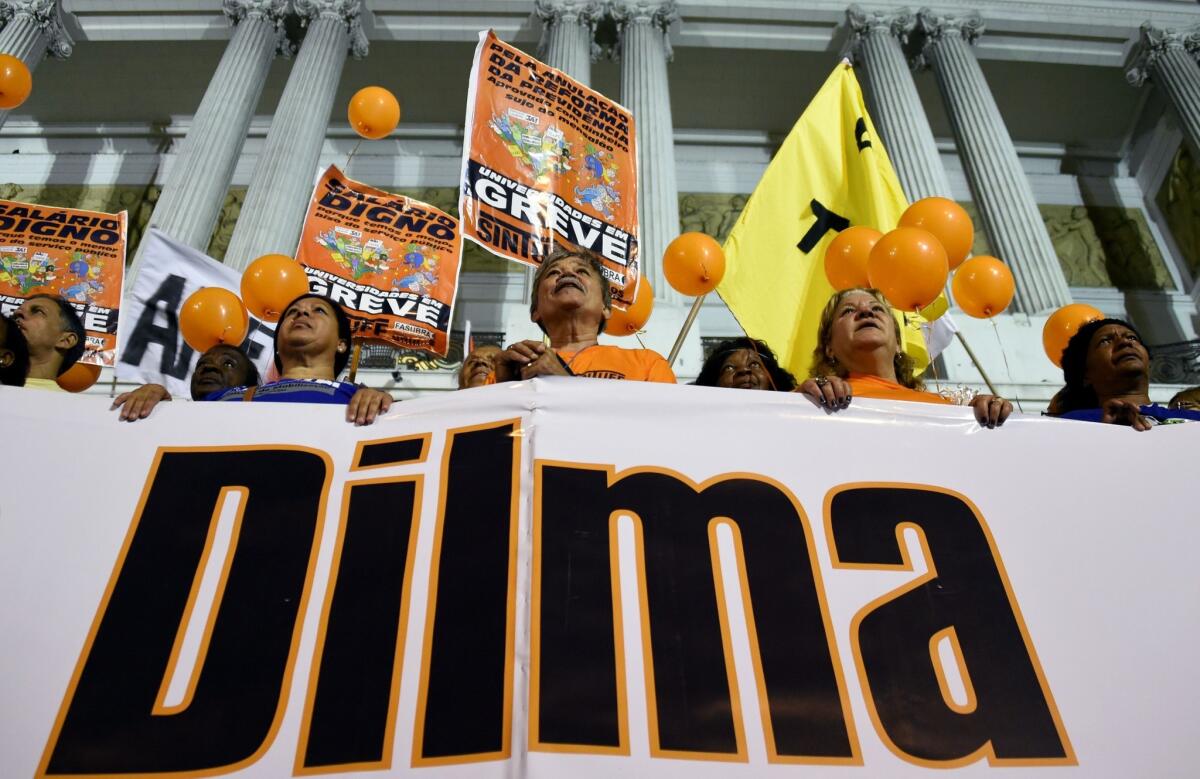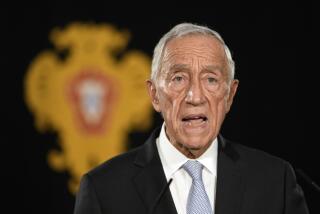Brazil’s president raises welfare payments ahead of election

Reporting from Sao Paulo — President Dilma Rousseff announced increases in payments for Brazil’s poorest citizens in honor of the country’s May 1st celebrations as she gears up to campaign for reelection in October.
Rousseff used a nationally televised speech Tuesday to defend the legacy of her Worker’s Party’s 11-year tenure and criticize opponents, who accused her of using the event to bolster her flagging voter support.
“Together, we will continue to make all the changes needed to improve the lives of Brazilians, especially the poorest and the middle class,” Rousseff said before announcing support for a higher minimum wage, and a 10% hike in cash transfers to 36 million Brazilians who are unemployed or earning low wages. She spoke of the need to “pay back a great debt we still owe to Brazil’s poorest workers.”
Brazil’s bolsa familia program has long been a flagship of the Worker’s Party government, which credits itself with the rise of about 40 million people out of poverty since the inauguration of party founder Luiz Inácio “Lula” da Silva in 2003. Rousseff, his former chief of staff, succeeded him after winning election in 2010.
Families with children who attend school and receive vaccinations currently receive as much as $63 a month from the federal government. A 10% increase is well above the annual inflation rate of roughly 6%.
Analysts say the payments are one of the government’s most important and popular programs among its largely poor electoral base.
Aécio Neves, presidential candidate from Brazil’s center-right PSDB party, said it was “lamentable” that Rousseff would use “an instrument of the state, such as a national television and radio broadcast, to conduct a political campaign and attack adversaries.”
When the election officially starts in August, Brazil’s laws will closely regulate broadcast appearances.
Apart from Neves, Rousseff will run against Eduardo Campos, a member of Brazil’s Socialist Party and formerly part of the governing coalition. Neves and Campos broadly share the social-democratic politics that dominate Brazil, but their ideology lies to the right of that of Rousseff. Their campaigns have been fueled by public disenchantment with relatively lackluster growth and complaints of mismanagement as the boom years wind down in Latin America’s largest economy and most populous country.
Rousseff remains the clear favorite, but a poll released in late April suggested her support has dropped 6.7 percentage points among likely voters, and remains below the 50% required to avoid a runoff in November.
Inflation and the poor performance of the state-run oil company, Petrobra, have dogged Rousseff’s government for several years. And serious doubts have been cast about her government’s ability to provide adequate facilities to host the FIFA World Cup, which starts in June.
“It’s unclear whether the package announced Tuesday will end up having a significant fiscal impact, or if they would have done something similar any year. But it’s likely the government is trying to repackage and reframe everything they’ve done as much as is realistically possible,” said Joao Augusto de Castro Neves, a political analyst at the Eurasia Group in Washington.
“Campaign season has started, and everything that [Rousseff] says will have some electoral motivation behind it,” he said.
Bevins is a special correspondent.
More to Read
Sign up for Essential California
The most important California stories and recommendations in your inbox every morning.
You may occasionally receive promotional content from the Los Angeles Times.









